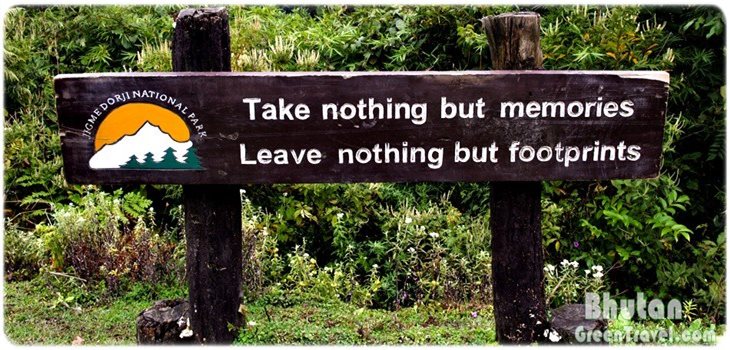According to World Tourism Organization (WTO), tourism is accountable for about 5% of global CO2 emissions and contributes to 4.6% of global warming. WTO further states that air travel is responsible for 40% of the total carbon emissions, the hotel industry accounts to approximately 20% of emissions as a result of air-conditioning, heating and maintenance of facilities, and recreations such as museums, theme parks, events and shopping contribute to around 3.5% of emissions.
There is no way that the WTO data on carbon emissions can ever decrease if we are never mindful of the activities we undertake, including travel and leisure, which refrain us from living a sustainable life.

| We travel for many reasons: To learn, collect memories, shop, recreate, hibernate or maintain a status symbol. As long as the outcome is morally upright, any reason is valuable. |

| Traveling either defines or shapes one’s character judging on the kind of impact one contributes toward social, economic, cultural and environmental progress which are the pillars of sustainability.
Thus, traveling green is not just an epitome of a well-protected ecosystem, but also a responsibility towards the said pillars of sustainability. |

| Despite zealous efforts of few responsible individuals and agencies, sustainable traveling is not yet a keyword. As such, the crisis on global warming is magnifying.
True enough, the end does not justify the means. We must have goals to substantiate our reasons for traveling. There has to be a greater purpose so as to make one’s life worthy. Be it sightseeing, shopping, or simply relaxation, let us keep these basic travel etiquettes as our habits: |
- PLAN your itineraries ahead of time prior to the trip and stick to it. It will save you a lot of time and resources when you are able to maximize your tours as planned.
- RESEARCH about the places of interest you intend to visit. It is necessary for you know the dos and don’ts of the places and strictly follow it. Behaving well is an indication of a mature individual deserving of high respect.
- STOP leaving your trashes behind. If you are trekking, strictly follow the marked trails, signage or reminders to protect the flora and fauna. Your trashes may accidentally feed the wildlife. It will not only damage the local inhabitants but it will also ultimately affect us if the sources of our daily food come from the oceans and forests.
- PATRONIZE only attractions that DO NOT exploit the wildlife such as: performing seals, dolphins, elephants, etc. Outside the show, you never how these animals are treated. They are created by GOD to live in its natural habitat for the purpose of a balanced ecosystem. Otherwise, there will always be catastrophes when we fail to recognize that a balanced nature is crucial. This is one of the reasons why natural calamities in parts of the world keep on happening.
- SELECT the small operators if you need to engage local tour operators. You do not only give them the chance to boost their business but also they have lesser impact on the environment because they will only utilize minimal energy and resources. It is also ideal if you choose operators who are advocates of preserving the natural resources, hire local guides, promote local culture and enterprise, and are members of The International Ecotourism Society. This means that they contribute to sustaining the livelihood of the local community. The same also applies when booking accommodation.
- SHOP locally made products or buy directly from indigenous artisans. These products are handmade out of native resources so it’s certainly free from harmful preservatives or chemicals. You are not only helping them preserve their livelihood but also their priceless culture. By preserving their livelihood, it will prevent them from leaving their native lands to join the saturated city life which does not give them any guarantee of decent living.
- BUY anything EXCEPT those made of endangered plants or animals. You will become an accessory to crime against the preservation of endangered creatures. BE COMPASSIONATE AND RESPONSIBLE. After all, your safety is dependent on how you treat people, the animals and the environment. Karma never sleeps.
- BRING your own reusable bag for shopped goods or items which you usually carry with you daily for the duration of the tour. We should know that plastics have high percentage of various toxic chemicals. It is non-biodegradable and if not carefully disposed, it severely harms the environment including the surroundings to which we live. As much as possible, buy foods which are not packed in plastic containers. The chemicals of the plastic transmit to the food and it compromises your health.
- BOOK your accommodation in a guesthouse. It has lesser carbon emissions through its cost-conscious efforts. Guesthouses or budget inns rarely do room cleanings. It cuts down on chemical cleansing agents, electricity for cleaning and water for washing the linens and towels or even for clothes if laundry service is availed. After all, you are out the whole time on tours so it is not practical to pay so much for expensive accommodations. But if you are really a big fan of pampering hotels, choose the ones that have sustainability initiatives such as engaging in recycling, energy and water conservation programs. It is always gratifying if you are contributing to the preservation of natural resources.
- BOOK airlines that have carbon offset programs. If possible, book non-stop flights for lengthy trips. There are airlines that use alternative cleaner fuels and renewable energy. Supporting their noble initiatives can help transform other airlines into implementing such programs as well.
- TAKE trains or buses in all your itineraries. Not only do you learn in greater detail but also these modes of transportation have lesser harmful impacts to the environment. To maximize your adventures and keep up to a healthier momentum, walking is best for itineraries within a distance. For driving distance, renting a hybrid or electric vehicle is not only cost-efficient but also environmentally friendly. As a frequent traveler, I am most fulfilled when I explore on my own without any guided tour dictating on the time and place I should be. Let this be your kind of experience too.
- TRAVELING is the best form of learning. The purpose of your travel should not be limited to leisure alone. It is also a perfect opportunity to learn intensely about the culture, dialect/language, delicacies and crafts, and interact beneficially with the local people. Enabling this kind of mastery empowers an individual and can deal articulately with people from all walks of life.

| When you leave a good impression to the places you visit, you demonstrate the kind of person you are and environment you come from.
Earning respect from fame and fortune is very superficial and unstable. But earning respect from being a RESPONSIBLE STEWARD towards the pillars of sustainability is timeless and priceless. What goes around comes around. Give genuine respect and it will come back to you. |

| Learn to travel greener and share it with others. You will reap immense benefits.
When an inspiration is passed on to another and consistently to many others, we are protecting Mother Earth and ultimately, our lives. Embrace sustainable traveling. Enjoy the rewards of being a green traveler! |
Originally published at jitrrieconomy.weebly.com


